Understanding Age Limits and Real Possibilities in Gestational Surrogacy
When it comes to surrogacy, one of the most frequently asked questions is: “Can an older woman be a surrogate?” The short answer is yes, but with some important caveats. While age certainly plays a role, it’s not the only factor that determines eligibility. In fact, many women in their late 30s and early 40s have gone on to be successful, healthy surrogates.
Let’s dive into what really matters when it comes to age and surrogacy — and bust a few myths along the way.
More: Surrogate Eligibility Quiz
Age and Surrogacy: What’s the Standard?
Most surrogacy agencies and fertility clinics establish a recommended age range for potential gestational carriers, typically between 21 and 40 years old. Some programs may extend that upper limit to 42 or even 45 in certain circumstances, especially for repeat surrogates who have already had smooth surrogacy journeys in the past.
But why is there an age limit at all?
The primary reason comes down to medical safety — for the surrogate and the baby. As women age, the risks associated with pregnancy tend to increase, including gestational diabetes, preeclampsia, and higher chances of needing a cesarean delivery. These risks don’t automatically disqualify someone, but they do require careful medical screening and clearance.
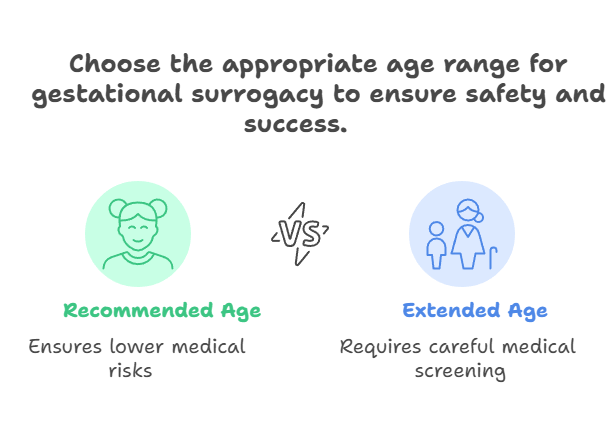
The Medical Factors That Matter Most
Age is just one piece of the puzzle. In fact, overall reproductive and general health often matter more.
Fertility specialists look at:
- A history of at least one full-term, uncomplicated pregnancy
- No major health conditions such as high blood pressure, diabetes, or autoimmune disorders
- A healthy BMI (body mass index)
- No history of pregnancy-related complications
- A uterus in good shape, capable of safely carrying a pregnancy
Older women who meet these criteria may still be very viable candidates for surrogacy. In fact, some clinics report that their most reliable, communicative, and responsible surrogates are in their late 30s or early 40s.
More: Can You Be a Surrogate After Tubal Ligation?
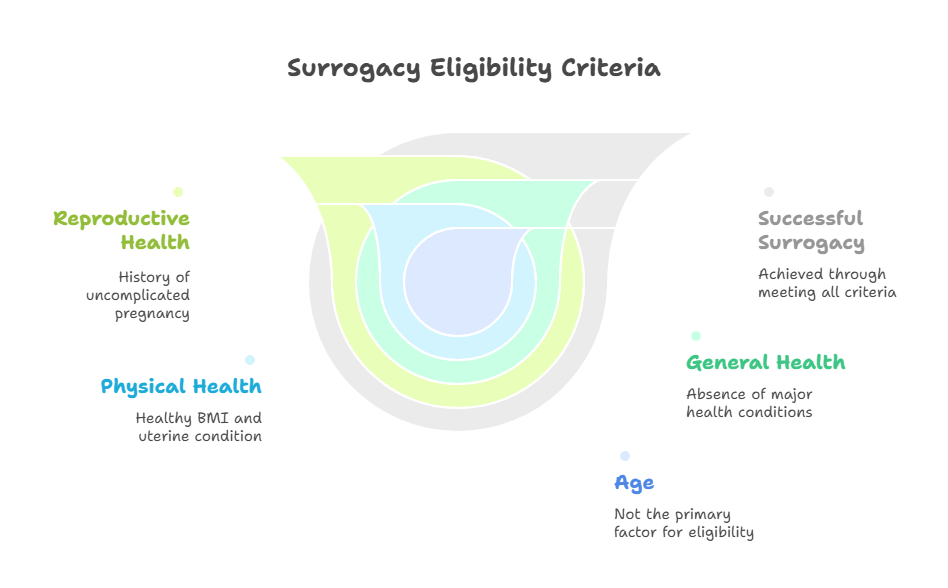
Gestational Surrogacy vs. Traditional Surrogacy: Key Difference
A major misconception is that a surrogate uses her own egg — which would make age far more significant. However, in gestational surrogacy (the most common form today), the surrogate carries an embryo created using an egg from the intended mother or an egg donor.
This means:
❗ The surrogate does not contribute DNA to the baby.
So while egg quality declines with age, that factor is irrelevant in gestational surrogacy. The surrogate is not biologically related to the baby — she is simply the carrier, providing a safe and loving environment for development.
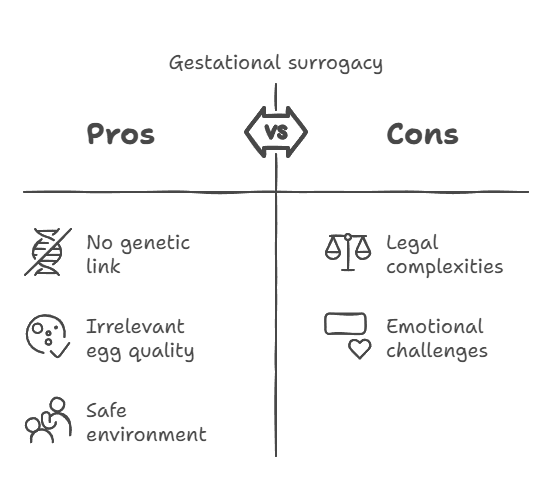
What About Surrogates Over 40?
While most agencies set 40–42 as their upper age limit, there are exceptions.
Some agencies and intended parents may approve women in their early to mid-40s if:
- They are experienced surrogates
- They’ve had recent successful pregnancies
- Their OB/GYN and reproductive endocrinologist both give full medical clearance
However, it’s rare for new (first-time) surrogates over the age of 43 to be accepted due to the increased risks and regulatory guidelines in place to protect everyone involved.
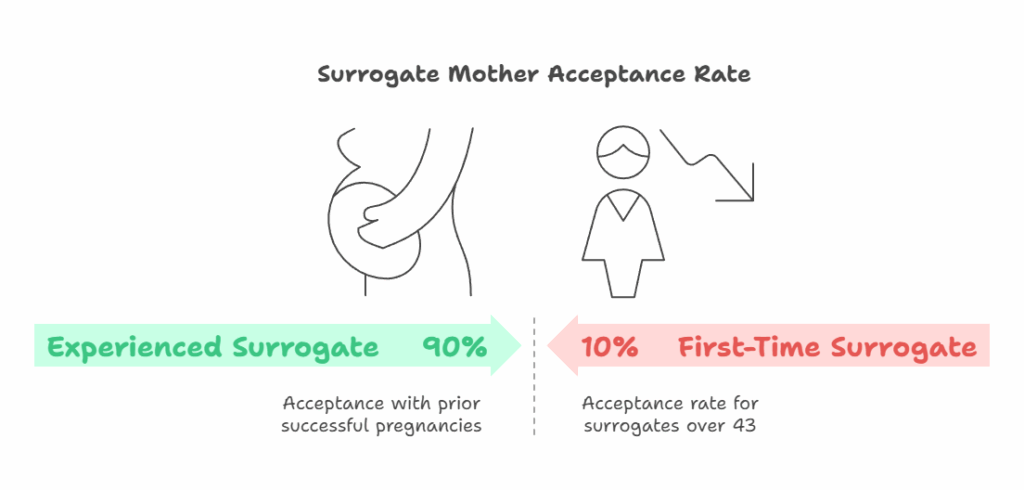
Emotional Maturity and Life Stability: An Asset
One of the biggest advantages older surrogates bring to the table is emotional readiness and life experience. Many are already mothers, often with older children, and they understand the demands and responsibilities of pregnancy.
They are typically:
- Better at setting boundaries
- Reliable with appointments and communication
- More emotionally grounded, especially when it comes to the separation process after birth
For intended parents, especially first-timers, having a surrogate who is mature, calm, and clear about her motivations can be incredibly reassuring.
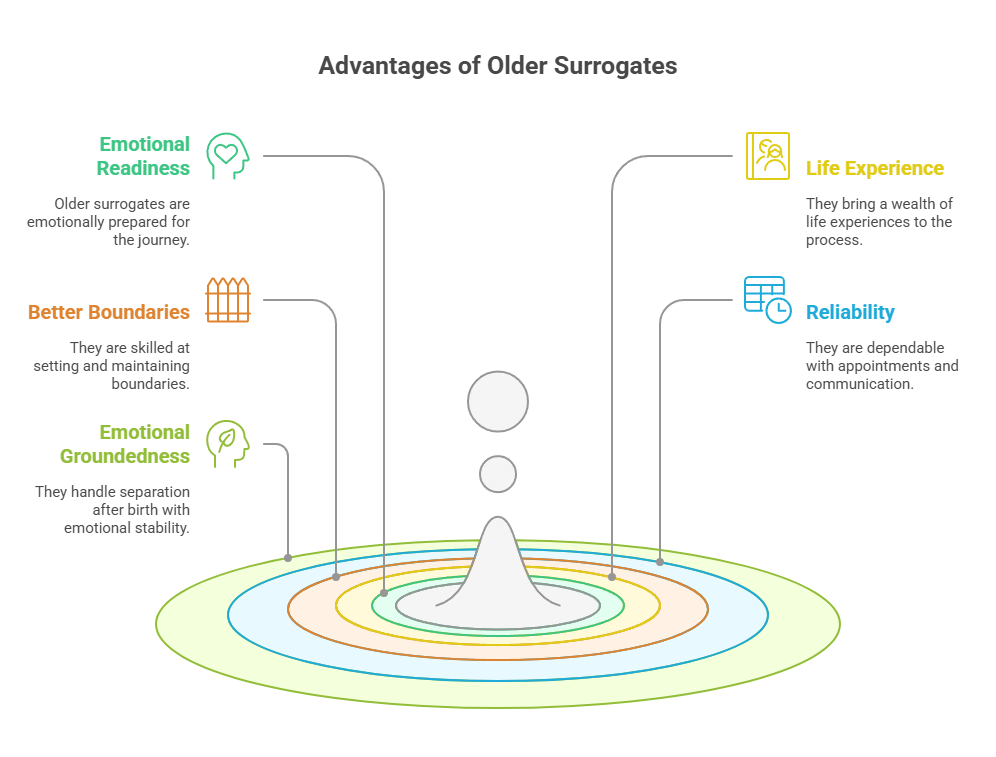
Common Myths About Age and Surrogacy
Let’s bust a few myths:
🔸 Myth #1: Older women can’t be surrogates.
✅ Truth: Many women in their late 30s and early 40s qualify, especially if they are healthy and experienced.
🔸 Myth #2: The baby will have the surrogate’s DNA.
✅ Truth: In gestational surrogacy, the embryo is created using the intended parent’s (or donor’s) egg and sperm — not the surrogate’s.
🔸 Myth #3: Older pregnancies are always risky.
✅ Truth: With proper screening and medical care, older surrogates can have smooth, healthy pregnancies.
More: Becoming a Surrogate: Is It the Right Choice for You?
If You’re an Older Woman Considering Surrogacy…
Here are a few steps to take:
- Consult with your OB/GYN to assess your medical history and get their opinion on whether you’d be a good candidate.
- Gather your pregnancy records, especially if you’ve had previous births.
- Contact a reputable surrogacy agency and ask about their age policies.
- Be honest about your age and health — agencies appreciate transparency.
- Stay open-minded. If you’re not eligible, you may still be able to support intended parents in other meaningful ways (e.g., egg donation, mentoring younger surrogates, or advocacy).
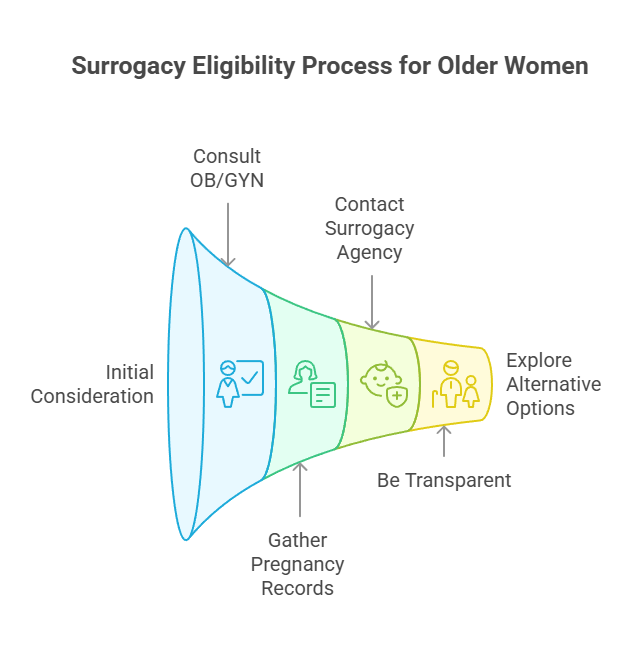
Final Thoughts
While there are age guidelines for surrogates, being “older” doesn’t automatically mean being disqualified. Many women over 35 — and even into their early 40s — successfully carry pregnancies as gestational surrogates every year. It all comes down to your health, pregnancy history, and the guidance of medical professionals.
Surrogacy is about more than biology — it’s about compassion, trust, and the desire to help build a family. If that’s where your heart is, don’t let age stop you from exploring the possibilities.




